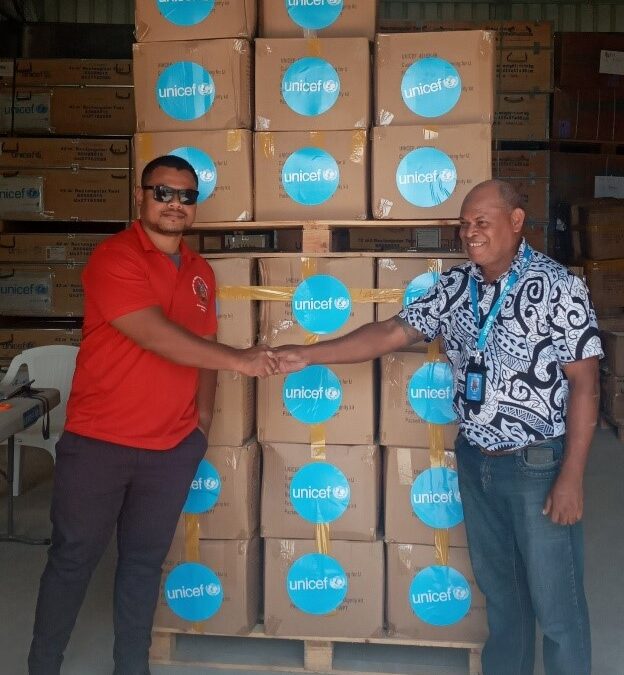

RWASH Officer (L) receiving items provided by UNICEF from UNICEF WASH Officer (R)
Health response to increasing diarrhoea cases in Gizo underway
A total number of 252 cases of Diarrhoeal diseases and five (5) number of deaths have been reported in Gizo as of June 8, 2021.
As part of response measures, community awareness on personal hygiene, safe storage of food and boiling of drinking water, and infection prevention and control practices is now underway in Gizo. Water samples have been collected for testing and environmental assessments are ongoing. The Ministry of Health is also strengthening surveillance in all surveillance sites across the country and closely monitoring the situation. Active surveillance of cases has been enhanced to bring in cases for early treatment and prevent dehydration and deaths.

Diarrhoea kits that were sent out to respective health centres that recorded diarrhoea increases this week.
Oral Rehydration Salt (ORS), the special liquid to help prevent children including adults from severe dehydration have also been distributed to all wards within Gizo hospital including Emergency Department with some ORS supplies including Infection, Prevention and Control kits to health facilities where diarrhoea is recorded. Additional medical supplies such as intravenous fluids and medicines have been mobilized to Gizo.

Content for hygiene kits distributed to some of the affected communities this week
Western Provincial health team have today mobilized number of vaccinators to be deployed to the affected areas to roll out the Rotavirus vaccine to children aged 10 and 14 weeks old who are yet to receive their Rotavirus first or second dosage.
National Health Ministry with support from UNICEF have also mobilized and commence deployment of additional supplies such as cartons of soaps ( 10 cartons) and dignity kits (5 cartons for 200 families) water purification tablets, sanitary pads for women and girls, washing detergents, child potty for proper child waste management, an all-purpose cloth and emergency lighting.
Plan for deployment of paediatric doctors to support response in Gizo is also being compiled and as soon as finalized, will be implemented.
Nevertheless, diarrheoa can be prevented, however, it requires willingness and commitment not only of health workers but more importantly that of parents and guardians, community leaders and elders to work together to ensure the following,
- Regular washing of hands with soap and clean running water after going to the toilet, after touching dirty surfaces and before eating or preparing food.
- Properly covering food and ensure drinking bottles and containers are properly covered from flies.
- Always boil drinking water and use chlorin tablets for drinking water and water sources.
- Parents if you have babies who are 10 or 14 weeks old, and yet to receive the rotavirus vaccine, please visit your nearest clinic for vaccination.
Rotavirus can spread easily from one person to another by touching the vomit or faeces of an infected person. For example, when touching the hands of someone who is sick with diarrhoea, when changing nappies of babies with diarrhoea, or even touching surfaces or objects that have been contaminated with diarrhoea or vomit or from eating contaminated food and drinking contaminated water. If handwashing is not done properly, the hands will carry the virus and can contaminate the water sources.
Diarrhoea and vomiting can cause severe dehydration, which can lead to death in babies and young children.
Parents are advised to take babies and infants to the nearest clinic as soon as they are experiencing watery diarrhoea, vomiting and fever or are showing signs of severe dehydration.
Signs of dehydration include:
- a dry or sticky mouth
- few or no tears when crying
- eyes that look sunken
- in babies, the soft spot (fontanelle) on top of the head looks sunken
- peeing less or fewer wet diapers than usual
- dry, cool skin
- irritability and tiredness
- drowsiness or dizziness
Do not try to use custom medicine. Custom medicine can kill babies and young children if they do not get enough fluids.
MHMS Press